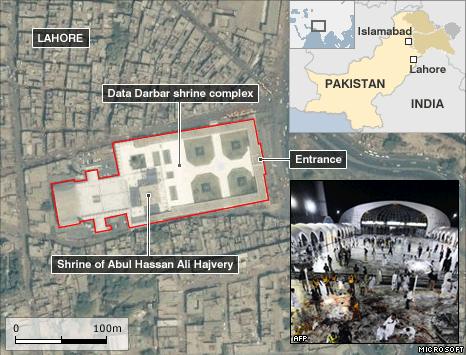High alert after Pakistan shrine suicide blasts
- Published
Police are on high alert across Pakistan after a deadly suicide attack on a Sufi Islamic shrine in the eastern city of Lahore.
Security has been increased in Lahore and at Sufi shrines across the country, after 42 people died at the Data Darbar shrine on Thursday.
Protesters have demonstrated outside the shrine, in anger at what they say were lax security measures.
Wider demonstrations were expected for later in the day, after Friday prayers.
The popular shrine holds the remains of a Persian Sufi saint, Abul Hassan Ali Hajvery.
It is visited by hundreds of thousands of people each year from both Sunni and Shia traditions of Islam.
The impact of the two blasts ripped open the courtyard of the shrine. Rescuers had to clamber over rubble as they carried out the victims.
The first attacker struck in the underground area where visitors sleep and prepare themselves for prayer, officials said.
As people fled, a second bomber detonated his explosives in the upstairs area.
The bombers are thought to have used devices packed with ball-bearings to maximise the impact of their attack.
A volunteer security guard at the shrine described scenes of devastation.
"It was a horrible scene," said Mohammed Nasir. "There were dead bodies all around with blood and people were crying."

The attack is the biggest on a Sufi shrine in Pakistan since militant attacks began in 2001.
"Those who still pretend that we are not a nation at war are complicit in these deaths," said Farahnaz Ispahani, a spokeswoman for President Asif Ali Zardari.
No group has said it carried out the attack, but correspondents say the attacks continue a growing trend among militants to target members of other sects as well as minorities.
The attack may also feed the pervading anti-American sentiment, a sense that US interference in the region is indirectly to blame, says the BBC's Jill McGivering.
US officials said they were still committed to helping Pakistan fight militants.
"We condemn this brutal crime and reaffirm our commitment to support the Pakistani people in their efforts to defend their democracy from the violent extremists who seek to destroy it," US Secretary of State Hillary Clinton said in a statement.
The US embassy in Islamabad said the attack "demonstrates the terrorists' blatant disregard for the lives of the Pakistani people and the future of this country".
Last October the US committed to a five-year, $7.5bn (£4.94bn) aid package to be spent on development projects.
The US has pressurised Pakistan to take action against Taliban insurgents using bases in the rugged border area along Afghanistan.
Lahore has been hit by a series of bomb attacks, including a suicide blast at anti-terrorist offices in March, when at least 13 people died.
In May, more than 90 people were killed in a double attack on the minority Ahmadi sect in the city.
Earlier, security chiefs had been congratulating themselves after June was the first month in two years in which there had been no suicide bombings in Pakistan.
They said it was proof the militant networks had been disrupted.
Last year Pakistan launched a major military offensive against militant strongholds in South Waziristan.
In December the military said they had achieved victory, but subsequent reports have suggested the militants remain active in the region.
- Published2 July 2010
- Published1 July 2010
- Published29 May 2010
- Published3 June 2010